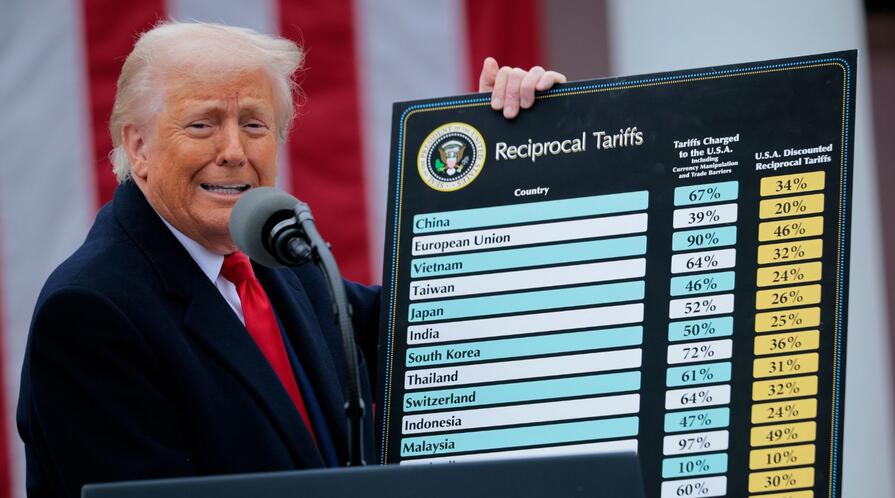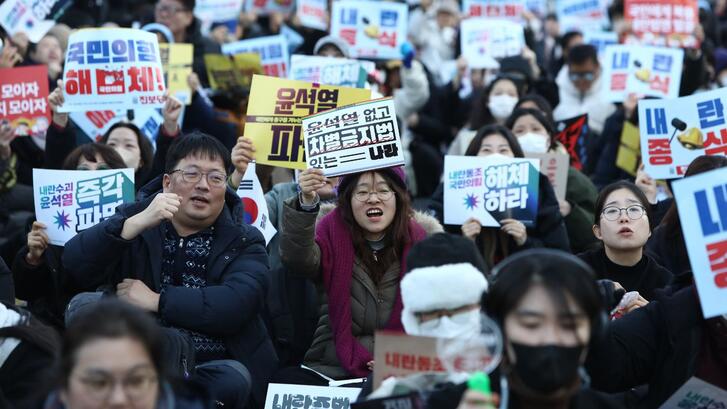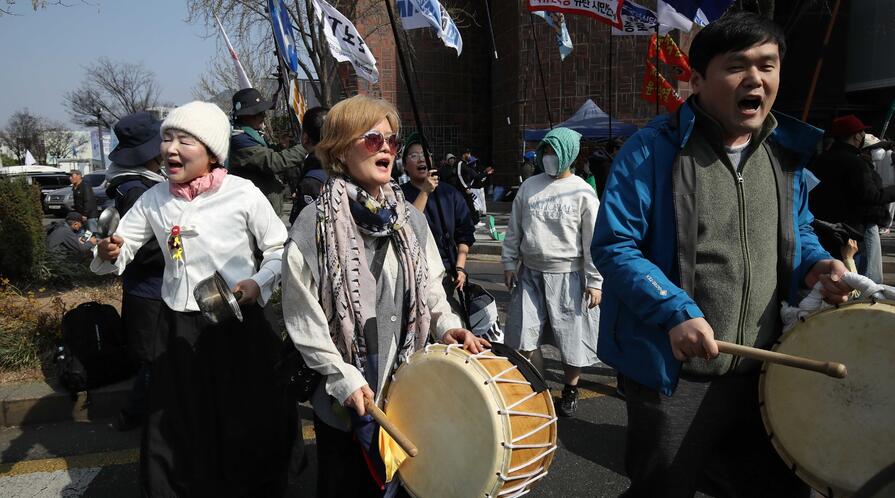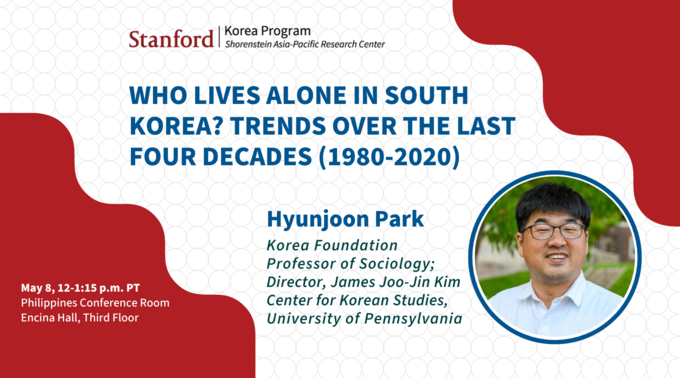Rethinking Health and Innovation in Aging Societies: Mai Nguyen and Jinseok Kim Explore Asia’s Health Policy Crossroads
How do aging populations reshape health and innovation policies in Asian economies? What role can the private sector play in public health service delivery, and how do individual preferences affect the development of emerging technologies? Mai Nguyen and Jinseok Kim, the 2024-25 Asia health policy postdoctoral fellows at APARC, focus on these questions as part of their research into health care service adaptation and behavioral economics.
At a recent joint seminar, “Health, Aging, Innovation, and the Private Sector: Evidence from Vietnam and Korea,” they offered a comparative look at how Vietnam and South Korea navigate aging populations, rising healthcare demands, and rapid technological change. While Nguyen focuses on health system design in Vietnam and Kim explores innovation diffusion in Korea, they both use discrete choice modeling to understand how individuals make decisions within systems influenced by age, infrastructure, and policy.
Sign up for APARC newsletters to receive updates from our scholars >
Nguyen and Kim’s work is supported by APARC’s Asia Health Policy Program (AHPP), which offers a postdoctoral fellowship each year to an early-career scholar conducting original research on health policy in the Asia-Pacific, particularly in low- and middle-income economies across the region. The fellowship demonstrates the program’s commitment to fostering the next generation of Asia-focused health policy researchers.
Vietnam’s Mixed Health System and the Role of Patient Choice
Mai Nguyen’s research centers around the role of private healthcare providers in Vietnam, especially for patients managing chronic diseases such as diabetes. She studies how patients choose between public and private healthcare providers, and what attributes of care they value most.
To analyze these preferences, she uses a method known as the Discrete Choice Experiment, which allows her to quantify the relative importance of various service attributes — such as appointment flexibility, doctor choice, quality of care, drug diversity, and cost coverage — in influencing patients’ decisions.
Nguyen’s interest in this topic began while she worked at Vietnam’s Ministry of Health. “That earlier work highlighted the growing contribution of the private sector in filling service delivery gaps, particularly in urban areas and for non-communicable diseases such as diabetes,” she says.
Her findings suggest that Vietnam’s private sector has become a necessary complement to public healthcare. “Despite potential downsides, such as increased costs, equity concerns, and profit-driven service delivery, my study finds that private healthcare helps relieve pressure on the public system and meets diverse patient needs.”
At APARC, Nguyen has sharpened the focus of her research under the mentorship of AHPP Director Dr. Karen Eggleston, a leading expert on public and private roles in Asian health systems. Nguyen also values her collaboration with Jinseok Kim. “Dr. Kim’s expertise provides valuable insights into how Korea is addressing the challenges of a rapidly aging population through innovative policy and service delivery models,” she notes.
Her time at Stanford has also broadened Nguyen’s horizons beyond traditional health economics. “I have developed a strong interest in the application of artificial intelligence to enhance the delivery of medical services,” she says. Looking forward, she plans to expand her research to Asian American populations in the United States, exploring how AI and digital health can improve diabetes care while also addressing barriers related to equity and access.
Innovation Adoption and the Aging Consumer in South Korea
Jinseok Kim investigates how aging affects new technology adoption and consumer behavior in South Korea, a country facing one of the fastest demographic shifts in the world.
“My current research involves looking at population aging and innovation diffusion, specifically in the context of the rapid aging trend in Korea,” Kim says. He studies how age influences consumer preferences in choosing new technologies such as electric vehicles, telemedicine, and generative AI platforms like ChatGPT.
Understanding these preferences, Kim argues, is critical for both policy and market strategy. “By working out the relationship between consumer choice and population aging, I forecast the effect of the population aging trend on the diffusion of innovative products and provide the potential policy and marketing implications for government policy and corporate management.”
The challenge, he says, lies in making sense of a wide range of behaviors across age groups and product types. “The biggest challenge I had in my studies was finding the overarching trend in the relationship between consumer choice for particular innovative products and population aging and then translating this finding into meaningful implications for society and the economy.”
Kim credits his time at APARC, especially participating in the Stanford Next Asia Policy Lab (SNAPL) meetings, with broadening his perspective. “Working as a member of SNAPL gave me insights and perspectives I didn’t have before,” he says.
SNAPL, directed by Professor Gi-Wook Shin, is an interdisciplinary research initiative housed within APARC addressing pressing social, cultural, economic, and political challenges in Asia through comparative, policy-relevant studies. The lab cultivates the next generation of researchers and policy leaders by offering mentorships and fellowship opportunities for students and emerging scholars.
Kim sees APARC’s model as effectively bridging academia and policy. “There are so many opportunities to interact with other scholars, policymakers, and practitioners,” Kim says. “Scholars here not only research and write, but they also get to share their voice and research findings in real-world policy.”
His advice to early-career researchers is straightforward. “Be more down-to-earth with your studies and thinking,” Kim says. “Sometimes scholars tend to get caught up in their way of thinking and perspective, but it may not be practical in real life. That is why I think it is important to just get outside and observe real consumer choice and behavior.”
Kim plans to continue researching questions related to innovation and demographic change to help governments and businesses adapt to aging populations and shifting consumer needs.
Ground-Level Data, Big-Picture Impact
Mai Nguyen and Jinseok Kim approach shared societal challenges through distinct yet complementary lenses. Nguyen’s research reveals how patient preferences can guide more effective public-private collaboration in healthcare, ultimately shaping systems that are more responsive to real-world needs. Meanwhile, Kim examines how patterns of technology adoption — especially among older adults — can influence the trajectory of innovation in aging societies.
Both scholars emphasize the value of ground-level data in addressing large-scale issues. By centering real behaviors and preferences, their work helps inform smarter, more adaptive policy, whether in designing patient-centered care or planning for technology's role in future societies. At APARC, their research bridges theory and practice, offering fresh insight into how Asian countries can navigate the twin forces of demographic change and rapid innovation.
Read More

As Asian economies grapple with aging populations, rising healthcare demands, and rapid technological change, APARC’s 2024-25 Asia Health Policy Program Postdoctoral Fellows Mai Nguyen and Jinseok Kim study large-scale health care structural and policy challenges from the lens of individual decision-making.


























